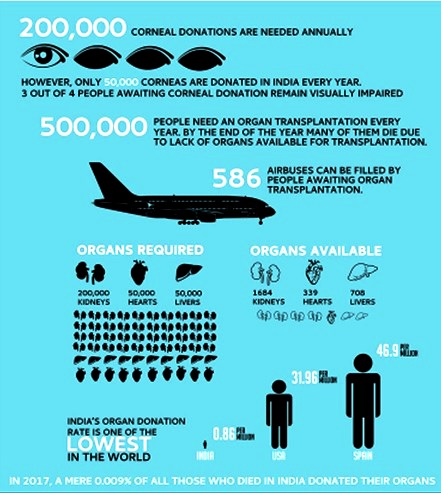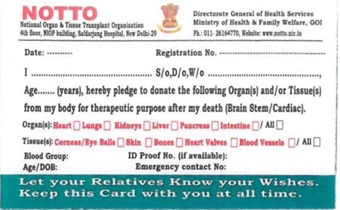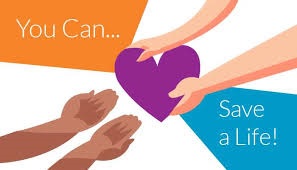Organ Donation- Leave a Legacy of Your Life
- Mayank
Just close your eyes for a minute and try walking around your house…. It must have been very difficult for you (Some of you might not even dare to try). Imagine the plight of those who do not have the vision and are left with darkness throughout their lives! And now, imagine the gift you could give them by sharing your ‘camera’ to view the ‘movie’ of life.
I presume people have heard about organ donation but are reluctant to talk about issues related to death- the harsh reality of life. The organs and tissues that can be donated are Liver, Kidney, Pancreas, Heart, Lung, Intestine, Bone, Skin, Cornea of the Eye, Heart Valve, Blood Vessels, Nerves and Tendon, etc. There are two types of organ donation:
- Living Donor Organ Donation: A person during his life can donate one kidney, a portion of the pancreas and a part of the liver. One kidney and half of the pancreas is capable of maintaining the body functions adequately for the donor and segments of the liver will regenerate after a period of time in both recipient and donor.
- Deceased Donor Organ Donation: A person can donate multiple organs and tissues after death. His/her organ continues to be useful for another person- In this article, I am primarily discussing this kind of donation.
Anyone regardless of age, race, color, or gender can become an organ and tissue donor after his or her death. In such cases, the consent of a near relative or a person in lawful possession of the dead body is required. If the deceased donor is under the age of 18 years, then consent is required from one of the parents or any near relative who can be authorized by the parents. Medical suitability for donation is determined at the time of death by medical experts.
World Organ Donation Day is observed on the 13th of August, every year -The aim is to motivate human beings to pledge to donate organs after their death and to spread awareness about the importance of organ donation. A single deceased donor can give life to about 6-9 recipients by donating 2 kidneys, liver, heart, lungs, pancreas, intestine, eyes and tissues. There have been many instances where people have come forward and helped others in need. In July 2020, a resident of Kerala Anujith had donated organs which gave new life to eight people.
Some other instances are mentioned in the references below.
Some numbers to emphasize the need for organ donation in India
- Although India has performed the second largest number of transplants in the world in 2019 (after the United States), it lags far behind western nations like Spain (35.1 persons as organ donors per million population -PMP), the United States (21.9 PMP) and United Kingdom (15.5 PMP) in national donation with a donation rate of only 0.65 PMP in 2019 due to its huge population.[1]
- With a 1 per million-donation rate, India would have 1,100 organ donors or 2,200 kidneys, 1,000 hearts, 1,100 Livers, 1,100 Pancreas and 2,200 Eyes. This should take care of almost all current demands for organs. [3]
- There is a need for 2 lakh kidneys, 50,000 hearts and 50,000 livers for transplantation every year. Even if 5-10% of all brain deaths are harvested properly for organ donation, technically there would be no requirement for a living person to donate organs.[3]
- Depiction of the requirement of organ donation in a diagram. [4]

- Among the states in India, Maharashtra, Tamil Nadu, Telangana and Gujarat are the frontrunners in organ donation. Personalities like Kapil Dev, Gautam Gambhir, Aamir Khan and Priyanka Chopra have pledged to donate their organs. Actress and Former Miss World Aishwarya Rai Bachchan had also promoted eye donation for a long time through various channels.[3]
For more statistics related to all countries, please visit the site of IRODaT – International Registry on Organ Donation and Transplantation
Legal, Social and Ethical issues
Organ Transplantation and Donation is permitted by law, as per “Transplantation of Human Organs & Tissues Act 2011” and you can check the details by clicking here.
Awareness regarding this subject would clear certain misconceptions. Some of these are:
- It is a wrong perception that the body of the donor would be mutilated or treated badly. The transplant team takes utmost care of the process (though I cannot vouch for this as I did not die even a single time in my life till now)
- Another misconception is that the doctors might not save a person’s life if they know that he/she is a donor. This notion is wrong because the doctors treating a patient are different from those in the transplant team. This transplant is separately contacted by the relatives of the donor. Further, the transplant team will only take those organs which are specified by the donor. Basically, we can rely on the transplant team to do their job. (Further, in case of donation by a deceased person, he/she is not living to verify how ‘painless’ the transplant procedure went)
- As far as religion is concerned, most major religions of the world do in fact permit, allow and support transplantation and donation. At the end of this article, I have stated the links for those who are interested in detailed analysis on this point.[5]
Let me for instance, take Hinduism and state the shreds of evidence mentioned there. In the list of ten Niyamas (or virtuous acts) mentioned in the Hindu scriptures, Daan (or selfless giving) is third and is held as being very significant within the Hindu faith [7]. In the words of Anil Bhanot OBE, Founding Member and Director of Hindu Council UK- “Hindus accumulate good Karma by selfless deeds and what better Karmic reward than to donate the body parts, especially on death when they are of no use to us, which can help others to live a better life -a Hindu tradition embedded in our scripture as evidently even in ancient India the Sage Rishi Shushruta practiced ‘transplant surgery’ with donated limbs and organs, likewise.” [6]
Involve your family
In case, a person decides to do the pious act of organ donation, he/she should inform the family and take them into confidence (More importantly, the ones younger than the donor should be convinced because it is probable that their voice will be the only voice after donor’s death). The process should be known to them and they should sink in with the philosophy- This will make it easier for them to honor the donor’s decision. Further, it would be wonderful if the complete family can be motivated for organ donation and give this act a compounding effect to do some significant good to society.
The Process
Many organizations have come forward to assist this cause but I would suggest and mention the national organization – National Organ and Tissue Transplant Organization (NOTTO). NOTTO is a national level organization set up under the Directorate General of Health Services, Ministry of Health and Family Welfare. It functions as the apex center for all Indian activities of coordination and networking for procurement, distribution of organs and tissues and registry of Organs and Tissues Donation and Transplantation in the country. [2] [4]
All you need to do is simply log in to their site and fill the donor pledge online by clicking here. Alternatively, you can download a Form for organ or tissue pledging on their site, fill it and send it to the organization. You will get a donor card and you can preserve that with your family.

This registration will help the organization keep track of donors and plan/allocate the resources accordingly. Even if you do not fill in the pledge before, you can directly call on their helpline number, (sometimes, the number is not reachable but do not worry that number works and they might be busy with important calls), after the death of the person who had decided to be a donor.
As per my conversation with the customer care representative of the NOTTO website, the process does not take much time and they ensure to make it hassle free for the relatives of the donor.
I personally feel that many people around us are generous enough to do good to the less fortunate people (And what a better time to give, when you can take nothing from the world). Awareness of this topic is the main reason due to which people have not come forward for this noble cause.
Please spread this message and let me know your thoughts or queries on this.
Probably, this is your only chance and (lazily speaking,) the ‘easiest’ chance to live life after your death, do not miss it.

References and for further information
- Organ donation in India
- Frequently Asked Questions from NOTTO’s website
- A study of the deceased organ donation environment in Delhi/ NCR
- Organ Donation facts and figures in India
- Religion and Organ Donation- guidelines of most religions on organ donation
- Organ donation and religious beliefs-A guide to organ donation and Hindu beliefs
- Hinduism and organ donation
- Organ transplants: an analysis of ethical, social and religious issues in a multi-cultural society (Malaysia)
- Cured of Covid-19, Rajasthan duo donates kidneys to save kin
- A journalist donates liver, gives second life to 8-year-old daughter
From the DummyWriter:
It was after visiting the cremation ground and witnessing the last ritual rites of a dear one, did I realize that a person, who was living a few hours ago, becomes a non-living ‘body’. I feel that we are so bound by the customs and rituals that we forget the main basis of these rules- to help mankind and in turn, get some peace within. If I can motivate a single person to pledge his organs by this article, I would be considering my words fruitful.
To read other articles by the same author, Click here
To read other articles on Lifestyle, Click here
To read other articles on this website, Click here
- We shall notify you about our new posts on your email provided. You may choose to unsubscribe anytime you want.